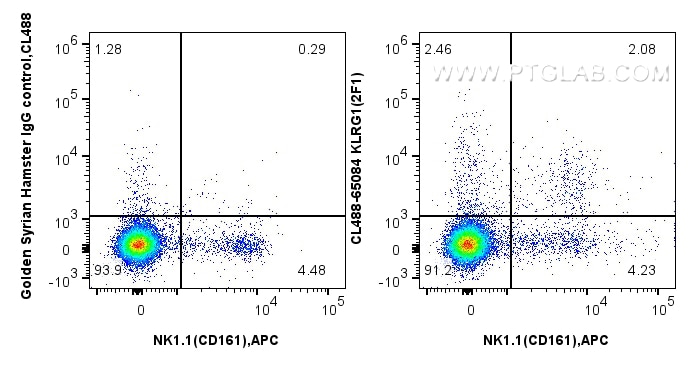CoraLite® Plus 488 Anti-Mouse KLRG1 (2F1)
KLRG1 Monoclonal Antibody for FC
Host / Isotype
Golden Syrian Hamster / IgG
Reactivity
Mouse
Applications
FC
Conjugate
CoraLite® Plus 488 Fluorescent Dye
CloneNo.
2F1
Cat no : CL488-65084
Synonyms
Validation Data Gallery
Tested Applications
| Positive FC detected in | mouse splenocytes |
Recommended dilution
| Application | Dilution |
|---|---|
| This reagent has been tested for flow cytometric analysis. It is recommended that this reagent should be titrated in each testing system to obtain optimal results. | |
| Sample-dependent, Check data in validation data gallery. | |
Product Information
CL488-65084 targets KLRG1 in FC applications and shows reactivity with Mouse samples.
| Tested Reactivity | Mouse |
| Host / Isotype | Golden Syrian Hamster / IgG |
| Class | Monoclonal |
| Type | Antibody |
| Immunogen | N/A |
| Full Name | killer cell lectin-like receptor subfamily G, member 1 |
| GenBank Accession Number | BC101953 |
| Gene Symbol | Klrg1 |
| Gene ID (NCBI) | 50928 |
| RRID | AB_2919257 |
| Conjugate | CoraLite® Plus 488 Fluorescent Dye |
| Excitation/Emission Maxima Wavelengths | 493 nm / 522 nm |
| Form | Liquid |
| Purification Method | Affinity purification |
| Storage Buffer | PBS with 0.1% sodium azide and 0.5% BSA, pH 7.3. |
| Storage Conditions | Store at 2-8°C. Avoid exposure to light. Stable for one year after shipment. |
Background Information
KLRG1 (killer cell lectin-like receptor subfamily G, member 1) is a C-type lectin inhibitory receptor that contains an immunoreceptor tyrosine-based inhibitory motif (ITIM) in its cytoplasmic domain. KLRG1 is expressed by subsets of NK and T cells, existing both as a monomer and as a disulfide-linked homodimer (PMID: 10741410; 19604491). It is considered to be a cell differentiation marker for NK and T cells and is strongly induced by viral and other infections (PMID: 20373518). Through interactions with members of the cadherin family, KLRG1 plays an inhibitory role on NK- and T-cell function (PMID: 19009530; 20373518).
Protocols
| Product Specific Protocols | |
|---|---|
| FC protocol for CL Plus 488 KLRG1 antibody CL488-65084 | Download protocol |
| Standard Protocols | |
|---|---|
| Click here to view our Standard Protocols |


